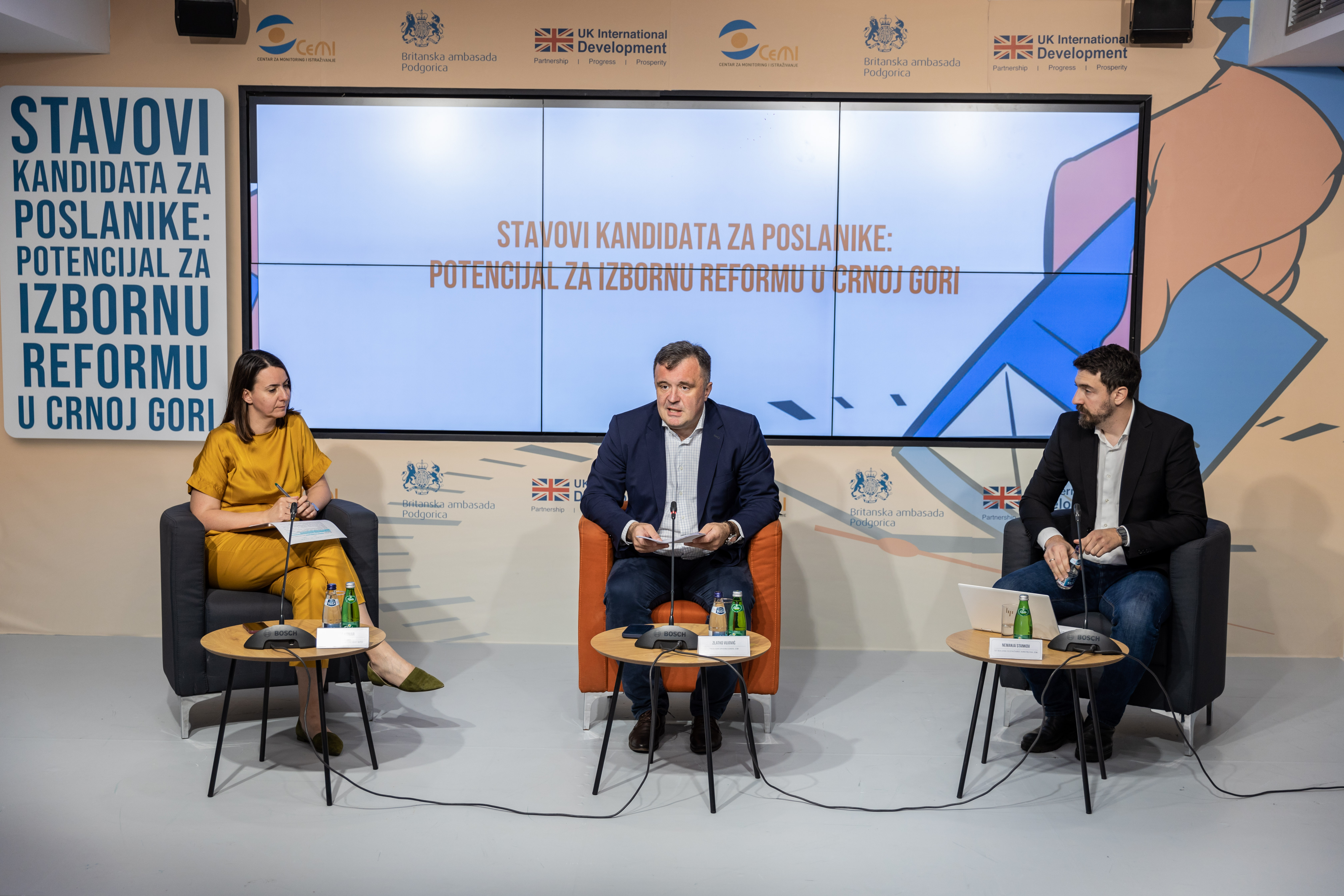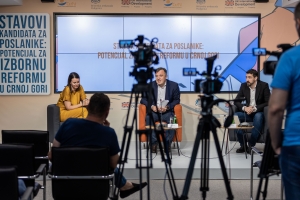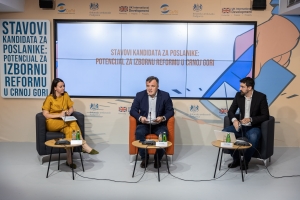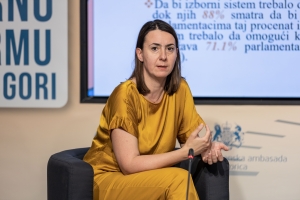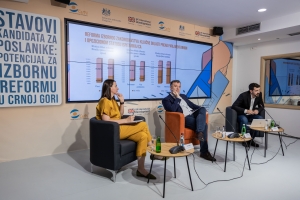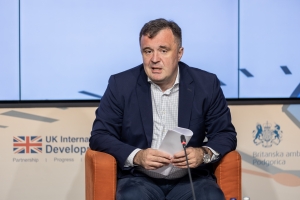In Montenegro, 86 percent of candidates for MPs who participated in the Montenegrin Comparative Candidate Survey (MCCS) believe that a comprehensive reform of the electoral legislation is necessary. This reform would involve voter rights, updating the voter registry, preferential voting, and increasing the representation of women.
This was announced at a press conference presenting the study "Candidates' Attitudes for MPs: Potential for Electoral Reform," conducted in collaboration with the Montenegrin Association for Political Science (MoPSA), as part of a project funded by the British Embassy in Podgorica.
Zlatko Vujovic, President of the Governing Board of CeMI, explained that in this phase of the project, the focus was on identifying shortcomings in the electoral framework and changes that would enhance the electoral process in Montenegro.
"The same survey was conducted in over 30 countries, allowing for comparison and tracking of temporal trends. It is important to note that in Montenegro, 15.9 percent of candidates for MPs were surveyed, while 53 percent of parliamentarians participated, which represents an exceptionally representative sample," Vujovic noted.
According to him, one of the key findings of the study is that 85.6 percent of respondents believe that electoral reform is necessary.
"This clearly indicates a significant need for improving the electoral system, especially in areas such as voter rights and updating voter registries," Vujovic said.
He explained that the data from the survey represent a significant resource for researchers and journalists, enabling more detailed analysis and comparison.
Vujovic also stated that the survey showed that in Montenegro, a proportional representation electoral system is highly valued among parliamentarians.
"This system allows for relatively fair and diverse political representation, which is considered one of the best characteristics of Montenegro's electoral system. However, the drawback of such a system is often reduced stability and difficulties in forming a government, which is easier to achieve in majoritarian systems," Vujovic explained.
According to him, preferential voting is also highly supported among Montenegrin parliamentarians.
"Even 97.5 percent of parliamentarians believe that this option should be introduced. Preferential voting allows voters to rank candidates according to their preferences, increasing the engagement and accountability of MPs. Introducing preferential voting with multiple votes per voter, either within one list or among multiple lists, is the most popular option. This option is supported by 71 percent of parliamentarians when limited to one list, while support increases to 92 percent when voting for candidates from different lists," Vujovic said.
He believes that MPs are aware that preferential voting would lead to greater engagement and competitiveness among candidates, thereby increasing their efficiency in parliamentary work and during election campaigns.
"Moreover, such a system would reduce the absolute power of party leadership, as the final selection of MPs would be in the hands of voters. The unique electoral district in Montenegro is also considered an advantage, as it avoids problems such as gerrymandering, which could favor ruling parties," Vujovic said.
He emphasized that the research showed that Montenegrin parliamentarians support a proportional system with preferential voting, considering it the best way to increase the accountability and engagement of elected representatives while enabling a fairer and more representative political scene.
Nemanja Stankov, Head of the Department for Public Policy Research at CeMI, explained that the survey covered a wide range of topics, including candidate behavior during election campaigns, their political beliefs, relationships with voters, political and work experience, as well as demographic characteristics.
"The main goal of our research was to analyze the potential for electoral reform in Montenegro through collected data. Through the research, we aimed to identify areas of political consensus that could contribute to the reform process: candidate engagement in pre-election campaigns, gender roles in Montenegrin politics, representation of voters in parliament, and electoral legislation reform," Stankov said.
Regarding candidate engagement during pre-election campaigns, Stankov said that the majority of candidates, 73.5 percent, stated that the goal of their campaign was to draw attention to the party rather than to themselves, "which is understandable given the closed lists and the order determined by parties."
"However, 61.6 percent of candidates raised some local issues during the campaign, showing concern for specific local problems. Openness to voters (77.9%) and concern for the socioeconomic well-being of the candidate's place of residence (83.5%) were the main topics during the campaign. Negative campaigning was mostly directed at parties rather than individual candidates," Stankov said.
He pointed out that the research showed a perception of gender-divided roles in Montenegrin politics.
"For example, gender equality and social protection are more associated with women, while defense and security policy are more associated with men. There is also a significant difference in perception between male and female respondents, especially in the field of foreign policy and defense and security policy," Stankov noted.
He said that the research showed that most candidates believe that elections and the electoral system do not adequately reflect voters' opinions, with 55.8 percent stating so.
Regarding how voting should occur in parliament "when there is a conflict of opinion between the party, voters, and candidates, the party's opinion usually prevails, except when the personal opinion of the MP conflicts with the party's opinion, where there is stronger support for MPs' autonomous voting," Stankov said.
He emphasized that the research showed a wide consensus that fundamental electoral legislation reform is necessary, with 85.6 percent of candidates for MPs and MPs believing so.
"The key reform area for the majority of respondents is sorting out voter rights and the voter registry. Candidates from ruling parties and those in parliament consider this the most important issue for reform," Stankov noted.
He concluded that there is room for political consensus, especially regarding increasing the representation of women through a quota system and introducing preferential voting.
"Our recommendation is to initiate the reform process around issues with the greatest consensus to overcome the current stalemate," Stankov concluded.
Olivera Komar, President of the Montenegrin Association for Political Science (MoPSA), said that MoPSA was established with the aim of advancing political science in Montenegro, explaining that it seeks to coordinate research efforts and position Montenegro on the global research map.
"One of the key problems we face is the lack of available and easily accessible data. Although data exists, it is often not collected in a way that allows for simple use. However, in recent years, Montenegro has participated in several international research projects that use a unique methodology for data collection, creating global databases. This enables comparison of changes at the state and regional levels over time," Komar stated.
She pointed out that Montenegro is currently participating in four major international research projects in the field of social sciences: The European Values Study, the European Social Survey, the Comparative Study of Electoral Systems, and the study on electoral processes presented today.
"These longitudinal studies provide valuable data that allow tracking changes in society and politics over time," Komar explained.
She stated that the association's special focus would be on encouraging young researchers to use this data.
"We plan to provide them with the necessary skills to work with data and to motivate them to participate in the global research community," Komar stated.
She emphasized that this research and the work of MoPSA contribute to a better understanding of political processes and help in creating a more transparent and inclusive society.
